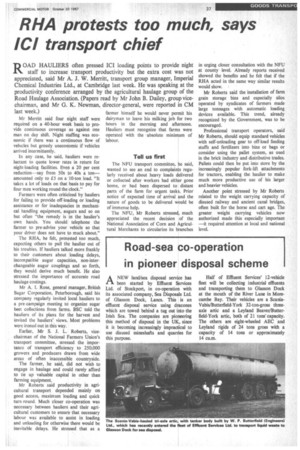RHA protests too much, says ICI transport chief
Page 39

If you've noticed an error in this article please click here to report it so we can fix it.
ROAD HAULIERS often pressed ICI loading points to provide night staff to increase transport productivity but the extra cost was not appreciated, said Mr A. J. W. Merritt, transport group manager, Imperial Chemical Industries Ltd., at Cambridge last week. He was speaking at the productivity conference arranged by the agricultural haulage group of the Road Haulage Association. (Papers read by Mr John B. Dailey, group vicechairman, and Mr G. K. Newman, director-general, were reported in CM last week.)
Mr Merritt said four night staff were required on a 40-hour week basis to provide continuous coverage as against one man on day shift. Night staffing was economic if there was a continuous flow of vehicles but grossly uneconomic if vehicles arrived intermittently.
In any case, he said, hauliers were reluctant to quote lower rates in return for night-loading facilities. Even a 20 per cent reduction--say from 50s to 40s a ton— amounted only to £5 on a 10-ton load. "It takes a lot of loads on that basis to pay for four men working round the clock."
Farmers were often criticized by hauliers for failing to provide off-loading or loading assistance or for inadequacies in mechanical handling equipment, augurs and so on but often "the remedy is in the haulier's own hands. You should telephone the farmer to pre-advise your vehicle so that your driver does not have to muck about."
The RHA, he felt, protested too much, expecting others to pull the haulier out of his troubles. If hauliers talked more frankly to their customers about loading delays, incompatible augur capacities, non-interchangeable augur couplings and so forth, they would derive much benefit. He also stressed the importance of accurate road haulage costings.
Mr A. I. Rose, general manager, British Sugar Corporation, Peterborough, said his company regularly invited local hauliers to a pre-campaign meeting to organize sugar beet collections from farms. BSC told the hauliers of its plans for the harvest and invited the hauliers' views. Most problems were ironed out in this way.
Earlier, Mr S. J. L. Roberts, vicechairman of the National Farmers Union's transport committee, stressed the importance of transport efficiency to 250,000 growers and producers drawn from wide areas of often inaccessible countryside.
The farmer, he said, did not wish to engage in haulage and could rarely afford to tie up valuable capital in other than farming equipment.
Mr Roberts said productivity in agricultural transport depended mainly on good access, maximum loading and quick turn-round. Much closer co-operation was necessary between hauliers and their agricultural customers to ensure that necessary labour was available to assist in loading and unloading for otherwise there would be inevitable delays. He stressed that as a farmer himself he would never permit his dairyman to leave his milking job for two hours in the morning and afternoon. Hauliers must recognize that farms were operated with the absolute minimum of labour.
Tell us first
The NFU transport committee, he said, wanted to see an end to complaints regularly received about heavy loads delivered or collected after workers had either gone home, or had been dispersed to distant parts of the farm for urgent tasks. Prior notice of expected time of arrival and the nature of goods to be delivered would be of immense help.
The NFU, Mr Roberts stressed, much appreciated the recent decision of the National Association of Corn and Agricultural Merchants to circularize its branches
in urging closer consultation with the NFU at county level. Already reports received showed the benefits and he felt that if the RHA acted in the same way similar results would show.
Mr Roberts said the installation of farm grain storage bins and especially silos operated by syndicates of farmers made large tonnages with automatic loading devices available. This trend, already recognized by the Government, was to be encouraged.
Professional transport operators, said Mr Roberts, should equip standard vehicles with self-unloading gear to off-load feeding stuffs and fertilizers into bins or bags or consider using the pallet system, as used in the, brick industry and distributive trades. Pallets could then be put into store by the increasingly popular fork-lift attachments for tractors, enabling the haulier to make much more productive use of his larger and heavier vehicles.
Another point stressed by Mr Roberts related to the weight carrying capacity of disused railway and ancient canal bridges, often built for the horse and cart age. The greater weight carrying vehicles now authorized made this especially important —it required attention at local and national level.








































































































































